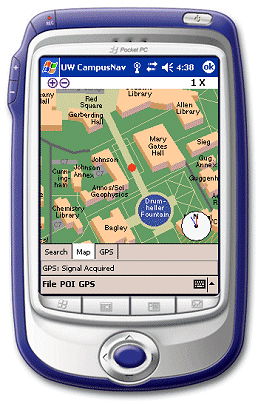
The theme of the UW-CUHK exchange is Mobile Computing. We
have brought this theme into the context of campus navigation to address
the problem: How can we help a person carry out necessary and everyday tasks
in an unfamiliar setting?
For example, a new student in a college
campus often has many needs to meet such as finding food, transport,
academic services, and contacting people but lack the knowledge of the
resources to accomplish these tasks. Instead they must rely on an
informal and inefficient system of asking people for directions, finding
maps and directories, and so forth.
We present the novel idea of a mobile device (nicknamed Campus Navigator) which
would be a user-friendly, efficient resource for people to navigate
new surroundings.
Principles of Mobile Computing:
- Accessibility: Interface should be simple and intuitive to allow for quick, on-the-spot information access.
- Location Awareness: Information should always be relevant to the user's current location.
- Mobility: Device should be efficient in both space and weight freeing the users from physical burdens.
- Security: Device should be secure enough for users to store personal data and respect user's privacy.
Research Areas:
- Automatic Speech Recognition: Enable machine to recognize what user said.
- Text to Speech: Convert information from text to synthesized voice
- Location Awareness: Enable device to position the user and present information specific to user position
Technical Approaches: Location-Awareness
For our project we have plans to utilize both Global Positioning System
(GPS) and wireless LAN (WLAN) to provide a robust positioning system that
would work indoors and outdoors. GPS is considered highly accurate in most
cases but requires a clear view of the sky, while location-awareness via WiFi
"hot spots" can be achieved in buildings. These two technologies working
in conjunction will allow users to use GPS navigation outdoors to locate
areas of interest like restaurants or street corners while using hot spots
to provide navigation inside buildings. In indoor uses,
a floor plan of the current building the user is in could be delivered to
the device screen.
We will use a Compact Flash GPS device specifically designed to
operate in the PocketPC environment. This GPS device connects to the PocketPC
through an expansion slot and is accessible by many commercial and non-commercial
software applications. We will be using freely available development libraries
to assist us in developing applications which can process the signals received by the GPS
device. Intel Research has offered us assistance and is providing us with their
current code for WiFi location-awareness to use and develop. Intel’s code is still experimental and
has not yet been ported to the PocketPC platform. We will be investigating
how to port the code and incorporate its functionality into our application.
Technical Approaches: Speech User Interface
One of the major research areas we will focus on is developing a
multimodal user interface. It is critical to have a user interface that
requires minimal attention, so the user can focus on their surroundings and
maintain mobility. For this reason a speech interface is a key component of
our multi-modal approach. We will investigate Microsoft’s speech engine software
in conjunction with Speech Application Language Tags (SALT). SALT is an
extension to existing markup languages likes XML and HTML. It enables developers
to create multimodal interfaces to web services or applications. Because SALT
is integrated within the actual HTML code, a multimodal interface can be created
using the native ink-based technology of PDA’s as well as speech technology.
The integration of SALT with web services will also provide a platform to use
distributed computing for speech processing.
